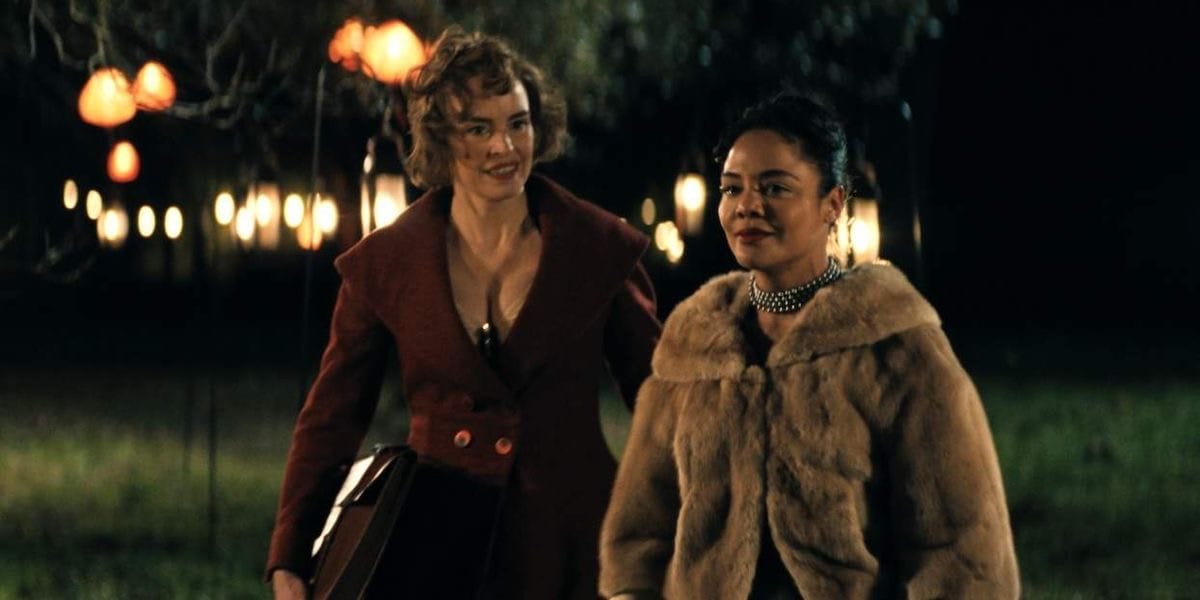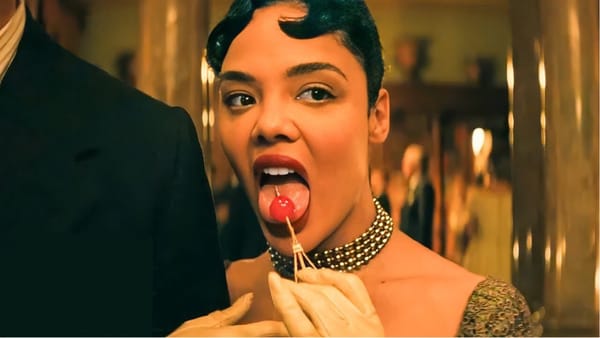★★★ (3 out of 4)
Nia DaCosta’s queer cinematic reimagining of Henrik Ibsen’s “Hedda Gabler,” now in theaters in advance of its streaming Prime video debut on Oct. 29, is trying to do two things at once. Break free of the theatrical form of the classic 1891 play. And still keep its themes of violence and female sexual repression. DaCosta doesn’t fully succeed, but it’s a joy watching her try.
Her best decision is casting Tessa Thompson to bring her own raging fire to Hedda. Having a Black woman play a role previously done on screen by, among others, Ingrid Bergman and Glenda Jackson, pays major dividends (lord knows what Ibsen would think). As does moving the play to the English countryside in the 1950s when repression still stifled free expression.
[Thompson]delivers an award-caliber performance as a resentful woman whose rapier wit is couched in such beauty and charm that her victims barely feel the blade going in.
Just returned from a six-month honeymoon with her stuffy, academic husband George Tesman (Tom Bateman), with whom she is suicidally bored, Hedda makes plans for an all-stops-out party at a country mansion the Tesmans cannot afford to lease. Sleazy family retainer Judge Brack (Nicholas Pinnock) provides a loan that he expects Hedda to repay with carnal favors. Boo. Hiss.
The country house and the party are not in the play, but DaCosta uses the mansion and its environs to set the story with Sean Bobbitt’s restless camera swirling around every nook and cranny, exhibiting a curiosity that blows the dust off anything stagey that might creep in.
It’s doubtful that would happen anyway with a livewire like Thompson around. She delivers an award-caliber performance as a resentful woman whose rapier wit is couched in such beauty and charm that her victims barely feel the blade going in. At least, not at first.
As the illegitimate daughter of the late General Gabler, Hedda prizes her legacy gift from daddy, a set of pistols that you just know will go off since DaCosta opens her film with a flash-forward to the police questioning Hedda. Earlier we see sureshot Hedda firing away with abandon on the great lawn, laughing as she just misses any strolling, preening male.
Holding the screen with Thompson takes an acting titan. And DaCosta finds her in the brilliant German actress Nina Hoss (“Tar”) who plays Eileen Lövborg, a former secret lover of Hedda’s and now her arch rival. The reason? Eileen is vying for the same job as George, which he needs to keep himself and Hedda financially afloat.

Ibsen fans know that he wrote the Eileen character as a man, but the curveball DaCosta is throwing somehow deepens the conflict since both women know winning this job is a fight for survival. Eileen has also written a book with her new lover (Imogen Poots), a fact that underlines for Hedda her own lack of talent, her own inability to determine the course of her life.
So for Hedda and Eileen, it’s a fight to the death. And suddenly a world created by a Norwegian playwright about a woman forced to connive and cheat to exist in a man’s world doesn’t seem that dated at all, at least not with DaCosta’s small but crucial changes.
“Hedda” works in fits and starts that can be frustrating, but at its best—with Thompson and Hoss firing on all cylinders—we’re watching two women on the verge of avoiding the fate Ibsen set down for them. I won’t tell you how the end of DaCosta’s movie differs from the play. But I will tell you that I see a note of shared defiance that’s worth cheering.

